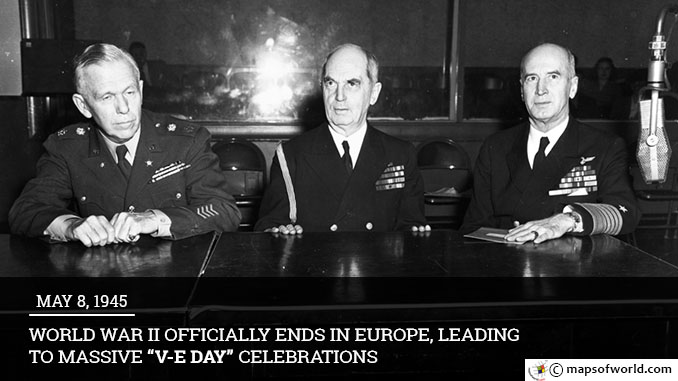After nearly six years at war, Europe was finally able to breathe a collective sigh of relief on May 8, 1945. Less than a day after the German Army submitted to an unconditional surrender at Reims, France, millions of people gathered in cities all over the world to celebrate the defeat of Adolf Hitler’s Third Reich. With more than 16 million soldiers and at least 23 million citizens killed in Europe alone — approximately 1 of every 10 people — World War II had taken a tremendous toll. Following the invasion of Poland on September 1, 1939, it seemed as if the Nazi war machine would be nearly unstoppable for almost four years. In battle after battle, Hitler’s soldiers vanquished every foe in front of them in every direction. Early in 1943, the Soviets began to roll the Germans back along the Eastern Front after the Battle of Stalingrad, benefitting from superior manpower and shorter supply lines, not to mention the foolishness of Hitler’s battle plans. When Operation Overlord hit the beaches of Normandy on June 6, 1944, the Nazi forces confronted massive armies advancing from three directions — Allied victory in North Africa allowed them to push resources into Italy, threatening to blow Benito Mussolini’s fragile military apart. Buttressing Italy while also defending France from the forces advancing as part of the D-Day invasion and retreating through Poland proved an insurmountable task. By February 1945, Soviet Premier Joseph Stalin, British Prime Minister Winston Churchill and President of the United States Franklin D. Roosevelt were discussing the management of post-war Europe at the Yalta Conference. By mid-April, the situation was bleak for the Nazis: the Soviets had pushed to within a few dozen miles of Berlin and the Allies were moving rapidly through western Germany. On April 30th, as the Red Army pelted the German capital, Hitler committed suicide in his personal bunker, leaving Grand Admiral Karl Doenitz to make the decision of when to begin negotiating peace. Seven days later, soldiers of the Third Reich were ordered to put down their weapons and surrender to Allied forces at Reims. Early on May 8, 1945, word that Field Marshall Alfred Jodl signed an instrument of surrender on Doenitz’ behalf the previous morning spread throughout the world. Within a matter of hours, joyous civilians took to the streets to celebrate the arrival of peace in Europe. Flags were unfurled in city squares all over the continent, particularly in places once occupied by the Nazi regime. Public euphoria ruled the day. Tens of thousands packed Times Square in New York as a similar number of Londoners gathered in Trafalgar Square. The exuberant spirit of Victory in Europe (V-E) Day overtook even the royal family — Princesses Elizabeth and Margaret slipped into the crowd dressed like average citizens to partake in the revelry. American President Harry Truman, celebrating his 61st birthday, referred to it as a welcome gift. Soviet officials, however, opted not to join in. The Red Army general who signed the document in the early morning hours of May 7th, Ivan Susloparov, was not authorized to speak for Stalin’s government. As far as the Soviets were concerned, World War II continued until a ceremony in Berlin attended by Field Marshal Wilhelm Keitel and General Georgy Zhukov the following day. It is for this reason that Eastern European countries celebrate Victory Day on May 9th. For the Nazi military along the Eastern Front, the shame of defeat was quickly overshadowed by the desire for self-preservation. Fearing the punishment awaiting in Soviet work camps, hundreds of German infantry units attempted to escape Czechoslovakia in order to avoid capture. Most were unsuccessful: as many as 2 million were caught and shipped away. In the weeks to come, Allied forces would attempt to retool for a shift to the Pacific Theater to vanquish the Japanese. Though the scourge of Nazism had ended, World War II still raged on the far side of the globe. But for the release of atomic bombs on Hiroshima and Nagasaki, V-J Day might have been years — and millions more casualties — later than August 14/15, 1945. Also On This Day: 1541 – Spanish explorer Hernando de Soto reaches the Mississippi River. 1886 – Pharmacist John Pemberton begins selling “Coca-Cola” as a medicine in an Atlanta drugstore. 1902 – Mount Pelee erupts on Martinique, killing more than 30,000 — all but a few of the Caribbean island’s population. 1933 – Mahatma Gandhi begins a 21-day hunger strike to protest British rule in India. 1984 – The Soviet Union announces it will boycott the Los Angeles Olympic Games.
May 8 1945 – World War II Officially Ends in Europe, Leading to Massive “V-E Day” Celebrations
After nearly six years at war, Europe was finally able to breathe a collective sigh of relief on May 8, 1945. Less than a day after the German Army submitted…
358
